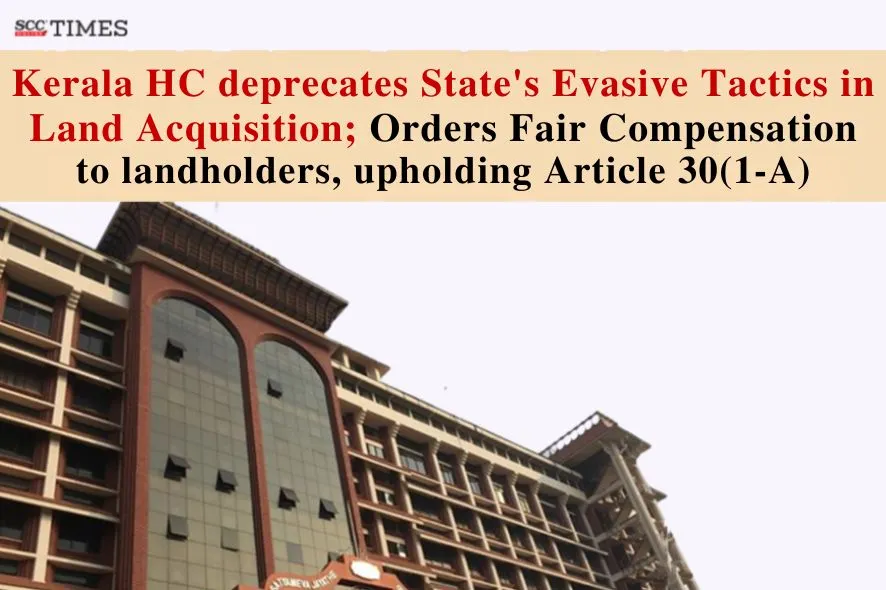Kerala High Court: The State, vide a notification, projected a need to widen the access to the bridge by acquiring the land belonging to Sree Venkateswara English Medium School, Thripunithura, (‘school’) managed by a linguistic minority community in Kerala. The present writ appeal challenged the notification primarily on the ground of Article 30(1-A) of the Constitution. The Division Bench of A. Muhamed Mustaque* and Harisankar V. Menon, JJ., while allowing the writ appeal, called out the State’s attempt to evade the constitutional restriction and ordered fair compensation to be paid to the appellants for their land already in the possession of the school authority.
Background:
A notification was issued by the State on 09-06-2006 providing that it needed the land belonging to the Venkateswara School, which was managed by Thulu Brahmana Yogam, a linguistic minority community in Kerala, for widening the access to the bridge. A writ petition was filed where a compromise was arrived at between the school authority and the State that in lieu of land from the school authority, they will be compensated by handing over the land belonging to the adjacent owners through the acquisition. The adjacent owners were the appellants herein. It appeared that the bridge was widened and constructed by using the school’s land, and to compensate for the land so acquired, a notification dated 19-05-2007 was issued to acquire the appellant’s land. Thus, the State had adopted an ingenious method to acquire the appellants’ land by invoking the Land Acquisition Act, 1894 (‘LA Act’).
In the present writ appeal, the appellants questioned the very claim of minority status by the school authority and contended that the acquisition was a colourable exercise of power. The challenge was dismissed by the Single Judge, and an award was passed on 22-03-2010. In the reference under Section 18 of the LA Act, the appellants did not participate, and the Reference Court held that the appellants were not entitled to enhanced compensation. An original petition was also filed on the same issue, so the Court decided to pronounce a common judgment for both the writ appeal and the original petition.
Analysis and Decision:
The Court referred to Society of St. Joseph’s College v. Union of India, (2002) 1 SCC 273, wherein the Supreme Court held that Article 30(1-A) of the Constitution mandated that a specific law was required to provide for the compulsory acquisition of property belonging to minority educational institutions, and without making a specific law, the State could not acquire the property of such institutions. The Court observed that in the present situation, and in the absence of any specific law enabling the acquisition of property belonging to a minority educational institution, it was not possible for the State to acquire the Venkateswara School’s land.
The Court noted that under Section 3(f)(vi) of the LA Act, land acquisition for educational purposes was permitted only when undertaken by government-established schemes, thereby restricting its scope. Additionally, clause (viii) clarified that land acquisition for companies did not qualify as a ‘public purpose’, and such acquisitions were allowed solely for specific objectives outlined in Section 40(1) under Part VII of the LA Act. Thus, it was evident that the LA Act deliberately provided a limited meaning to ‘public purpose’.
The Court opined that to overcome the constitutional restriction of the State’s failure to address the mandate under Article 30(1-A) of the Constitution, a compromise was entered into with the school on the promise that the land of adjacent holders would be acquired to compensate for the loss suffered by the school. Such a compromise was regarded as a private arrangement and a private contract, having no backing of law, and rather reflected the deceitful means adopted by the State to get over the constitutional embargo.
The Court observed that the acquisition of land was based on the promise arrived at in a settlement rather than upholding any public purpose related to the school and it could still function, even after the acquisition of land from the school authority. Since it was a private school, there was no public purpose element considering the restricted meaning assigned to public purpose under the LA Act.
The Court further opined that even in the Right to Fair Compensation and Transparency in Land Acquisition, Rehabilitation and Resettlement Act, 2013 (‘2013 Act’), the applicability of the Act was excluded even for private educational institutions and private hotels. The Court observed that this acquisition was a dubious attempt to wriggle out the constitutional embargo rather than acknowledging any other elements constituting public purpose under the law. The Court opined that the entire land acquisition proceedings must be set aside, including the notification under Section 4(1) of the LA Act but the appellant’s counsel admitted that the possession of the land was already taken over, and now it was vested with the school authority.
The Court, therefore, allowed the appeal and directed the Collector to calculate the compensation in accordance with the 2013 Act and upon payment or deposit of the amount, the appellants must execute a conveyance deed, on meeting the entire expenses by the State, in favour of the Government or its nominee.
[Sulaiman M.S. v. State of Kerala, 2025 SCC OnLine Ker 6391, decided on 21-08-2025]
*Judgment Authored by: Justice A. Muhamed Mustaque
Advocates who appeared in this case:
For the Appellants: Madhu Radhakrishnan, Advocates.
For the Respondents: Kurian George Kannanthanam (SR.), N. Anilkumar, S. Ranjith, Sr. Government Pleader, K.P. Jayachandran, Addl. Advocate General.


